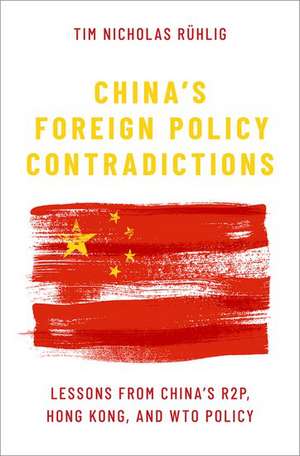China's Foreign Policy Contradictions: Lessons from China's R2P, Hong Kong, and WTO Policy
Autor Tim Nicholas Rühligen Limba Engleză Hardback – 29 apr 2022
Preț: 438.24 lei
Preț vechi: 485.77 lei
-10% Nou
Puncte Express: 657
Preț estimativ în valută:
83.87€ • 87.24$ • 69.24£
83.87€ • 87.24$ • 69.24£
Carte disponibilă
Livrare economică 13-19 martie
Preluare comenzi: 021 569.72.76
Specificații
ISBN-13: 9780197573303
ISBN-10: 0197573304
Pagini: 278
Dimensiuni: 251 x 165 x 28 mm
Greutate: 0.54 kg
Editura: Oxford University Press
Colecția OUP USA
Locul publicării:New York, United States
ISBN-10: 0197573304
Pagini: 278
Dimensiuni: 251 x 165 x 28 mm
Greutate: 0.54 kg
Editura: Oxford University Press
Colecția OUP USA
Locul publicării:New York, United States
Recenzii
By elaborating on the diversity of actors and the multiple layers of Chinese politics, he offers a sound explanation for the perceived contradictions in China's engagement in global affairs and delineates ways to deal with an internally fragmented China.
Drawing on extensive policy research and over 150 ethnographic interviews, the book admirably details the internal dynamics of Chinese policy-making and offers a valuable counterweight to portrayals of China as a monolithic unitary actor.
Rühlig's original approach argues that China's foreign policy contradictions derive from competition between various legitimacy-seeking actors in the complex set-up of the Chinese party-state...This work is essential reading for anyone seeking to understand the complexities of China's foreign policy decision-making that goes beyond the usual unitarystate simplifications often found in the literature.
Drawing on extensive policy research and over 150 ethnographic interviews, the book admirably details the internal dynamics of Chinese policy-making and offers a valuable counterweight to portrayals of China as a monolithic unitary actor.
Rühlig's original approach argues that China's foreign policy contradictions derive from competition between various legitimacy-seeking actors in the complex set-up of the Chinese party-state...This work is essential reading for anyone seeking to understand the complexities of China's foreign policy decision-making that goes beyond the usual unitarystate simplifications often found in the literature.
Notă biografică
Tim Nicholas Rühlig is a research fellow at the German Council on Foreign Relations and an associate fellow with The Swedish Institute of International Affairs analyzing Europe-China relations and Chinese foreign and industrial policy—including high technology and Hong Kong politics. His current projects focus on China's domestic determinants of Chinese foreign policymaking, China's growing footprint in technical standardization, the emerging US-China technology rivalry and its implications for Europe. In addition to his academic research, Rühlig provides policy advice to European policymakers such as the European Commission. He chairs the working group "high technology and innovation" of the EU-funded COST Action "Europe in China Research Network" (CHERN) and is a member of the European Think-tank Network on China (ETNC), which he coordinated in 2018.
